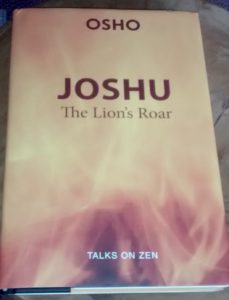Talks on Zen

Joshu: The Lion’s RoarThrough these symbolic Zen dialogues and the existential language of haikus, Osho urges his reader not to be lukewarm, but single-pointed in the search for our authenticity. “A hair′s breadth of difference and what happens?” Joshu is asked. There is no intellectual answer to the koans of Zen, no approximate answer and no amount of intellect to be applied: “Heaven and earth are far away.”
Only by authenticity can we rise in consciousness. And as this lion′s roar of Joshu resounds through almost twelve centuries, so is its message more urgent. Through these symbolic Zen dialogues and the existential language of haikus, Osho urges his reader not to be lukewarm, but single-pointed in the search for our authenticity.
Impression of Joshu: The Lion’s Roar
“On one occasion, as Joshu was receiving new arrivals in his monastery, he asked one of them, ‘Have you been here before?’ Small things to be noted: one, the master himself is at the reception desk receiving new arrivals. Zen is an effort to look into your potentialities. Why waste time? – not even a few moments. So the master is receiving new arrivals at the gate of the monastery. In the first encounter with each new arrival it will be determined whether he is worthwhile to work upon, or just to let him have a cup of tea and move on. “And the question that he asked does not mean what you think it means. Have you been here before. He is not talking about the ordinary ‘here,’ he is talking about the ultimate ‘here.’ It is not concerned with the place, the monastery, or Joshu. It is concerned with a meditative state where time ceases and only now-ness remains; where space disappears and only here-ness is left behind.
The Approach of Zen
This now and here, these two words, contain the whole approach of Zen. If you can be now and here, nothing else has to be done. Every door of existential mystery will be opened unto you.”So when a man like Joshu asks, Have you been here before? don’t misunderstand him. He is not talking about the place, he is talking about spacelessness, timelessness. “Have you ever been in deep meditation?” – that is what he is asking.
ZEN MEESTERS: JOSHU THE LION’s ROAR
Talks On Zen
Na twintig eeuwen is de Leeuwen-schreeuw van Joshu opnieuw tot leven gebracht door Osho’s commentaren op deze uitzonderlijke man, een van de meest geliefde meesters in de Zen-traditie. Het boek  begint met Joshu’s unieke eerste ontmoeting met meester Nansen die erkent dat Joshu geen initiatie nodig heeft en een speciale behandeling gegeven moet worden. Verder omvat Joshu the Lion’s Roar de ultieme piek van Joshu’s eigen bewustzijn en de daaruit voortvloeiend ontplooiing als een meester op zijn eigen manier.
begint met Joshu’s unieke eerste ontmoeting met meester Nansen die erkent dat Joshu geen initiatie nodig heeft en een speciale behandeling gegeven moet worden. Verder omvat Joshu the Lion’s Roar de ultieme piek van Joshu’s eigen bewustzijn en de daaruit voortvloeiend ontplooiing als een meester op zijn eigen manier.
Terwijl hij deze anekdotes, dialogen en haiku’s gebruikt om Joshu’s leven te documenteren, creëert Osho tegelijkertijd een omgeving in het hier en nu waarin Osho zijn gehoor en lezers tevens een Zen meester in actie kunnen ervaren. De krachtige, to the point en hard treffende talks eindigen alle met een korte meditatie en ze geven een duidelijke richting aan voor al diegenen die op zoek zijn naar de waarheid: de enige manier is naar binnen gaan en het is tijd om te ontwaken!
Op de uitvaart van een van zijn monniken, nam Joshu deel aan de stoet en gaf het volgende commentaar: “Wat een lange stoet van dode lichamen is er in het gevolg van het ontwaken van een enkele levende mens!”
Het boek is in een vorige editie vaak tweedehands verkrijgbaar en de nieuwe uitgave zal te zijner tijd te bestellen zijn via internet.
Introduction to Joshu the Lion’s Roar
Of all the stories Osho Rajneesh has shared with His disciples through the years this story is surely one of the al time favorites:
“I have told you a story, a very ancient story, about a lioness giving birth to a cub while she was jumping from one hillock to another hillock. The cub fell into a crowd of sheep and grew up amongst the sheep. There was no way for him to know that he was not a sheep. And the sheep were not afraid, they never thought that he was dangerous.
was dangerous.
“One day an old lion saw this phenomenon and could not believe it! He had never seen any lion walking in a crowd of sheep. The moment sheep see a lion they start running-naturally. But this young lion believed he was a sheep.
“The old lion was a man just like Joshu. He got hold of him. He started trembling, and the old lion said, ‘You are trembling and weeping and crying and asking that you should be released because you want to join your group. There is something you don’t know, it seems you are unaware, and I will not leave you unless I make you aware. You come with me!
“He dragged him to a nearby lake. The lake was silent-no ripples, no wind was there. He took the young lion to the edge of the water and told him, ‘Look in the water. Look at my face and your face.’
“Instantaneously, from the young lion a roar came out. It was not any effort, it was simply the fact of seeing that he is a lion immediately a roar that resounded in faraway mountains.
“The young lion thanked the old lion and said, ‘You have been very kind to me. Otherwise my whole life I would have lived chewing grass with the sheep. You have given me a new birth.”